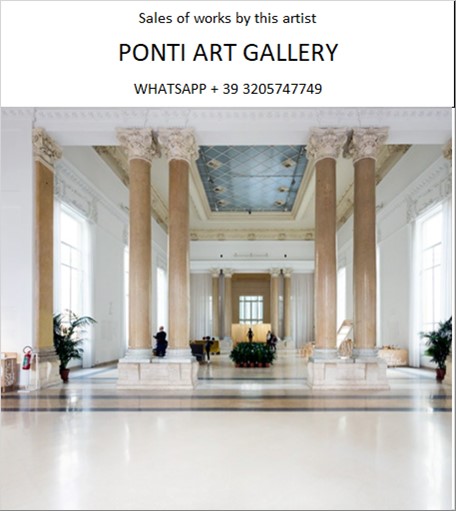Ponti Art Gallery is interested in buying and selling works
of art by this artist.

Huma Bhabha Biography
Huma Bhabha, born in 1962 in Karachi, Pakistan, is a Pakistani-American sculptor renowned for her evocative works that traverse the realms of memory, war, displacement, and the lingering shadows of colonialism. Her journey from Karachi to the global art stage is a testament to her profound engagement with the human condition, material innovation, and the interplay between history and imagination.
Bhabha's early life in Karachi was steeped in creativity, nurtured by her mother, a talented amateur artist. This environment, rich in art books and discussions about art, laid the foundation for Bhabha's artistic inclinations. Despite her mother not practicing professionally, her influence was pivotal in shaping Bhabha's perception of art as a vital mode of expression and inquiry. The familial support for her artistic aspirations led Bhabha to travel to the United States in 1981, where she pursued her formal education in art.
At the Rhode Island School of Design, Bhabha honed her skills in printmaking and painting, graduating with a BFA in 1985. Her education continued at Columbia University, where she earned an MFA in 1989. It was during her time at Columbia that Bhabha's exploration of materials and form began to take a distinctive turn. Influenced by her work with artist Meyer Vaisman, Bhabha delved into the realms of assemblage and collage, gradually shifting her focus from two-dimensional works to the three-dimensional form. This transition was not just a change in medium but marked the beginning of Bhabha's lifelong engagement with sculpture as a primary mode of expression.
Bhabha's sculptures are characterized by their unique materiality and form. Often described as grotesque yet tender, her works are a confluence of found materials such as styrofoam, clay, cork, and rubber, alongside traditional sculpting materials like bronze. This eclectic mix of materials serves not only as a testament to Bhabha's innovative approach to sculpture but also as a commentary on the transient and often discarded elements of modern life. Her sculptures, which she refers to as "characters," occupy a liminal space between the ancient and the post-apocalyptic, evoking themes of survival, memory, and the cyclical nature of history.
The artist's Pakistani heritage and her experiences in the United States inform much of her work, which addresses the global impacts of colonialism, war, and displacement. Bhabha's sculptures and installations often draw from a wide array of cultural, historical, and artistic references, from ancient Greek Kouroi and Gandharan Buddhas to African sculpture and Egyptian reliquary. Yet, her work remains firmly rooted in the contemporary, reflecting on current global crises and the human capacity for both destruction and resilience.
Bhabha's significant contributions to contemporary art have been recognized through numerous solo and group exhibitions worldwide. Notably, her work "We Come in Peace" was installed on the rooftop of the Metropolitan Museum of Art in New York in 2018, and she has been featured in prestigious venues such as the Venice Biennale, the Whitney Biennial, and the Institute of Contemporary Art in Boston. Her sculptures and works on paper are part of several major public collections, including the Museum of Modern Art in New York, the Centre Pompidou in Paris, and the Tate in London.
Living and working in Poughkeepsie, New York, with her husband, artist Jason Fox, Bhabha continues to push the boundaries of sculpture. Her work, a profound meditation on the human figure and its myriad representations across cultures and epochs, challenges viewers to confront the complexities of identity, history, and the environment in an increasingly fragmented world. Through her innovative use of materials and her evocative thematic explorations, Huma Bhabha stands as a pivotal figure in contemporary art, whose work resonates with the urgency and depth of our times.
Huma Bhabha Quotes and Sales
of Works
Ponti Art Gallery selects and deals with paintings by the
artist. Upon request, we provide free estimates and
evaluations, communicate prices, quotations, and current
market values.
If you are interested in BUYING or SELLING works by the
artist, contact us immediately.
If you wish to sell or receive an evaluation of the
works:
Send us a frontal photo of the painting, one of the back,
and one of the signature. Also, indicate the dimensions of
the work. Inform us about the purchase origin of the work
and any kind of available documentation (purchase
receipts, certificates of authenticity, publications). One
of our operators will respond to you on the same day. We
guarantee maximum confidentiality and extreme
professionalism.
If you wish to purchase works by the painter: Contact us
and let us know your request. We will inform you about the
available works. We also offer the possibility to
subscribe to our NEWSLETTER, through which you will be
informed at the beginning of each month about the latest
acquisitions of the art gallery.
You can send us pictures of the work:
